Browse our Growing Library of Success Stories
By:
Leopold Conservation Award Program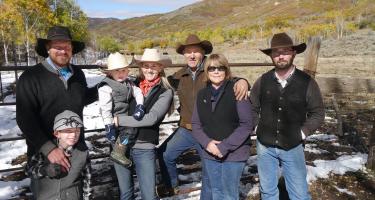 Ercanbrack Livestock’s story began amid the Great Depression with a hearty handshake and $12 an acre on the front steps of the Summit County Courthouse. Since then, four generations of ranchers have ridden the same trails and shared a passion for the land.
Ercanbrack Livestock’s story began amid the Great Depression with a hearty handshake and $12 an acre on the front steps of the Summit County Courthouse. Since then, four generations of ranchers have ridden the same trails and shared a passion for the land.
https://www.landcan.org/success/Ercanbrack-Livestock/3417/
By:
Leopold Conservation Award Program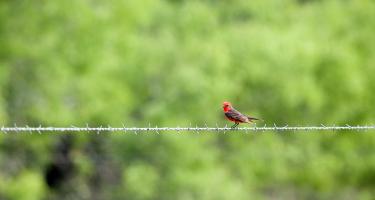 Arthur “Buddy” Temple purchased Temple Ranch, near Lufkin, in 1992. Since that time, Buddy and Ellen Temple, along with ranch operators, Robert and Jenny Sanders, have introduced many beneficial conservation practices.
Arthur “Buddy” Temple purchased Temple Ranch, near Lufkin, in 1992. Since that time, Buddy and Ellen Temple, along with ranch operators, Robert and Jenny Sanders, have introduced many beneficial conservation practices.
https://www.landcan.org/success/Temple-Ranch/3411/
By:
Leopold Conservation Award Program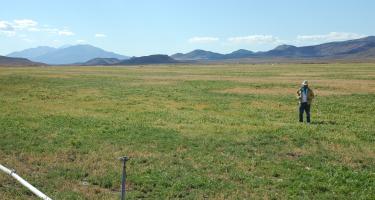 Brothers Blaine, Brent, and Jay Tanner and their families represent the fifth and sixth generations and over 130 years of Tanners ranching in the Grouse Creek valley in Box Elder County. Della Ranches is comprised of 17,000 acres of private land and an additional 175,000 acres that is managed through state and federal grazing permits, giving the Tanners responsibility for conservation efforts on 192,000 acres of grazing and farmland.
Brothers Blaine, Brent, and Jay Tanner and their families represent the fifth and sixth generations and over 130 years of Tanners ranching in the Grouse Creek valley in Box Elder County. Della Ranches is comprised of 17,000 acres of private land and an additional 175,000 acres that is managed through state and federal grazing permits, giving the Tanners responsibility for conservation efforts on 192,000 acres of grazing and farmland.
https://www.landcan.org/success/Della-Ranches/3416/
By:
Leopold Conservation Award Program Thomas Jefferson Thurston was the first known European man to consider permanently settling the Weber River Valley in what is now known today as Morgan County. When Thomas saw Morgan Valley for the first time, he was immediately drawn to its green hills, which reminded him of his Ohio home. He and his family cleared the area and settled the land that is now Circle Bar Ranch.
Thomas Jefferson Thurston was the first known European man to consider permanently settling the Weber River Valley in what is now known today as Morgan County. When Thomas saw Morgan Valley for the first time, he was immediately drawn to its green hills, which reminded him of his Ohio home. He and his family cleared the area and settled the land that is now Circle Bar Ranch.
https://www.landcan.org/success/Circle-Bar-Ranch/3415/
By:
Leopold Conservation Award Program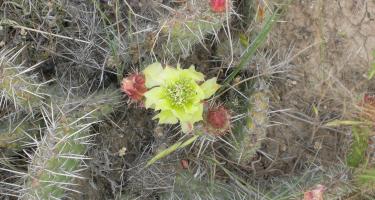 Barlow Livestock Inc. is a family owned and operated ranch located twenty miles west of Gillette. It was started in 1898 by L.H. Barlow who, as a 14-year-old boy, left home and settled in the Gillette area. Barlow Livestock Inc. is owned by Glenn and Joy Barlow, who operate the ranch with Glenn's mother, Gertrude, and their children, Duce and Trey.
Barlow Livestock Inc. is a family owned and operated ranch located twenty miles west of Gillette. It was started in 1898 by L.H. Barlow who, as a 14-year-old boy, left home and settled in the Gillette area. Barlow Livestock Inc. is owned by Glenn and Joy Barlow, who operate the ranch with Glenn's mother, Gertrude, and their children, Duce and Trey.
https://www.landcan.org/success/Barlow-Livestock-Inc/3438/
By:
Leopold Conservation Award Program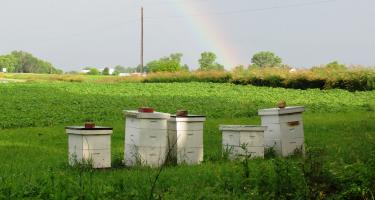 David Meuer considers himself lucky to have been introduced to conservation practices through his father, who saw value in investing in the health of the land. When David purchased his own land and took over his father’s farm, he continued to uphold the conservation ethic his dad instilled in him.
David Meuer considers himself lucky to have been introduced to conservation practices through his father, who saw value in investing in the health of the land. When David purchased his own land and took over his father’s farm, he continued to uphold the conservation ethic his dad instilled in him.
https://www.landcan.org/success/Meuer-Farm/3435/
By:
Leopold Conservation Award Program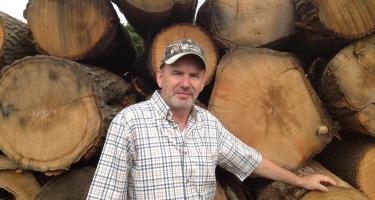 Terry Peters is a fourth generation timber harvester and timberland owners with more than 3,000 acres in northern Wisconsin. He got his start by following his father, Howard, on logging jobs as often as he could. Peters also spent time working in his grandfather’s sawmill. Like his grandfather and father, Peters has passed the timber tradition along to three of his sons: Cody, Corey, and Jamie. As Howard Peters says, the family has “sawdust in the blood.
Terry Peters is a fourth generation timber harvester and timberland owners with more than 3,000 acres in northern Wisconsin. He got his start by following his father, Howard, on logging jobs as often as he could. Peters also spent time working in his grandfather’s sawmill. Like his grandfather and father, Peters has passed the timber tradition along to three of his sons: Cody, Corey, and Jamie. As Howard Peters says, the family has “sawdust in the blood.
https://www.landcan.org/success/Terry-Peters/3436/
By:
Leopold Conservation Award Program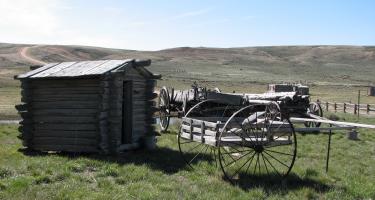 Ron and Linda Heward’s 7E Ranch, which celebrated 100 years in 2009, is a sixth generation cattle and sheep operation located in northeastern Carbon County in the heart of the Shirley Basin Grasslands. The Hewards have always taken a “family first” approach when it comes to their agricultural operation. Ron and Linda believe that the primary purpose of their ranch was to raise their 6 children, as well as their 13 grandchildren, all of whom currently assist them with the ranch.
Ron and Linda Heward’s 7E Ranch, which celebrated 100 years in 2009, is a sixth generation cattle and sheep operation located in northeastern Carbon County in the heart of the Shirley Basin Grasslands. The Hewards have always taken a “family first” approach when it comes to their agricultural operation. Ron and Linda believe that the primary purpose of their ranch was to raise their 6 children, as well as their 13 grandchildren, all of whom currently assist them with the ranch.
https://www.landcan.org/success/7E-Ranch/3437/
By:
Leopold Conservation Award Program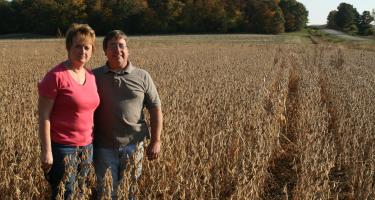 Jim and Valerie Hebbe, along with their daughter, Ashley, operate a cash grain farm in Green Lake County. In his nearly 30 years of experience in melding conservation and agriculture, Jim is the essence of adaptive management.
Jim and Valerie Hebbe, along with their daughter, Ashley, operate a cash grain farm in Green Lake County. In his nearly 30 years of experience in melding conservation and agriculture, Jim is the essence of adaptive management.
https://www.landcan.org/success/Hebbe-Farm/3433/
By:
Leopold Conservation Award Program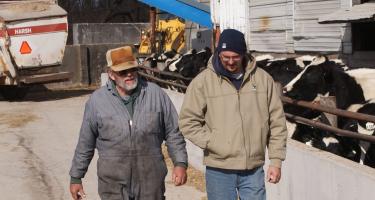 Koepke Farms Inc. is a partnership between brothers Alan, David, Jim and Jim’s son John. Together, they milk 320 cows and operate 1,000 acres of cropland plus another 150 acres of woods and wetlands.
Koepke Farms Inc. is a partnership between brothers Alan, David, Jim and Jim’s son John. Together, they milk 320 cows and operate 1,000 acres of cropland plus another 150 acres of woods and wetlands.
https://www.landcan.org/success/Koepke-Farms/3434/
By:
Leopold Conservation Award Program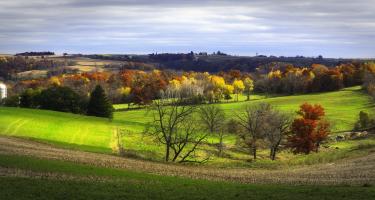 Gerry Mich's story of a lifelong commitment to conservation began 30 years ago when he and his two brothers purchased 20 acres of woods in Portage County. There, they and Gerry's future wife, Margo, planted 1,000 red pine seedlings by hand.
Gerry Mich's story of a lifelong commitment to conservation began 30 years ago when he and his two brothers purchased 20 acres of woods in Portage County. There, they and Gerry's future wife, Margo, planted 1,000 red pine seedlings by hand.
https://www.landcan.org/success/Gerry-Mich/3432/
By:
Leopold Conservation Award Program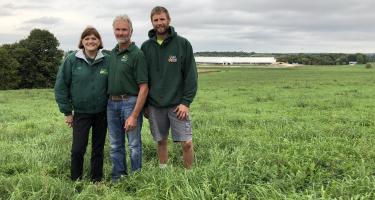 Some farmers focus on yield and profit. David Geiser is also driven by conservation and education.
Some farmers focus on yield and profit. David Geiser is also driven by conservation and education.
https://www.landcan.org/success/David-Geiser--Gold-Star-Dairy/3431/
By:
Leopold Conservation Award Program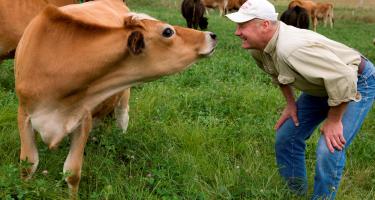 When Dick Cates’ father purchased the family’s Iowa County farm in the 1960’s, it consisted of a few small tilled fields and largely unmanaged pastures. Today, it is a model of how to farm in a manner that is good for the business and good for the land.
When Dick Cates’ father purchased the family’s Iowa County farm in the 1960’s, it consisted of a few small tilled fields and largely unmanaged pastures. Today, it is a model of how to farm in a manner that is good for the business and good for the land.
https://www.landcan.org/success/Cates-Family-Farm/3430/
By:
Leopold Conservation Award Program When Luther West acquired his 160-acre homestead in 1855, he was required to clear at least 5 acres and build a claim shanty. However, in less than three years, he cleared nearly 80 acres and built a large home on what is now Brooks Farms. Luther’s spirit of going above and beyond what is required remains a driving force for Ron Brooks and his daughters Alyssa, Kelsey, Zoey and Sydney, who each strive to conserve, improve and in some cases restore the same land Luther tamed over 160 years ago.
When Luther West acquired his 160-acre homestead in 1855, he was required to clear at least 5 acres and build a claim shanty. However, in less than three years, he cleared nearly 80 acres and built a large home on what is now Brooks Farms. Luther’s spirit of going above and beyond what is required remains a driving force for Ron Brooks and his daughters Alyssa, Kelsey, Zoey and Sydney, who each strive to conserve, improve and in some cases restore the same land Luther tamed over 160 years ago.
https://www.landcan.org/success/Brooks-Farms/3429/
By:
Leopold Conservation Award Program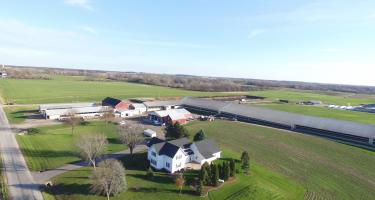 Established in 1848, Brickstead Dairy is a fifth-generation farm in Brown County, Wisconsin. Since partnering with his father in the 1990s, Dan Brick has grown the farm's dairy herd to 900 cows.
Established in 1848, Brickstead Dairy is a fifth-generation farm in Brown County, Wisconsin. Since partnering with his father in the 1990s, Dan Brick has grown the farm's dairy herd to 900 cows.
https://www.landcan.org/success/Brickstead-Dairy/3428/
By:
Leopold Conservation Award Program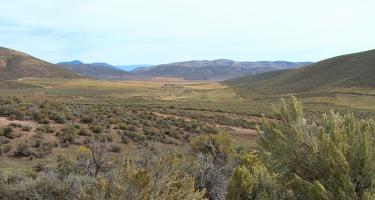 Near the west side of the Wellsville Mountains is Goring Ranch, a third generation sheep outfit owned and managed by Bill Goring, his wife Sherie and their son Blake. Bill attributes his family’s good fortune in the business to the hands-on approach and strong initiative passed down from his father, who built the ranch from scratch.
Near the west side of the Wellsville Mountains is Goring Ranch, a third generation sheep outfit owned and managed by Bill Goring, his wife Sherie and their son Blake. Bill attributes his family’s good fortune in the business to the hands-on approach and strong initiative passed down from his father, who built the ranch from scratch.
https://www.landcan.org/success/WF-Goring-and-Son-Inc/3426/
By:
Leopold Conservation Award Program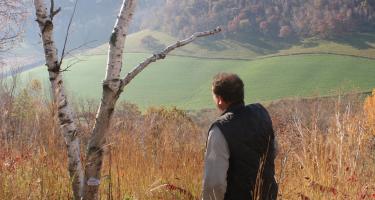 Everything on Joe Bragger’s Buffalo County farm is connected and has a purpose: The cows and the chickens, the trout and the trees, the soil and the stream. He not only loves the land, but clearly sees what it can do for him and what he can do for it.
Everything on Joe Bragger’s Buffalo County farm is connected and has a purpose: The cows and the chickens, the trout and the trees, the soil and the stream. He not only loves the land, but clearly sees what it can do for him and what he can do for it.
https://www.landcan.org/success/Bragger-Family-Dairy/3427/
By:
Leopold Conservation Award Program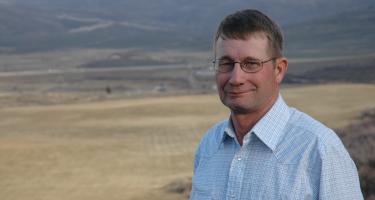 While managing their 178,000 acres of land near Park City, Steve Osguthorpe and his family carry on a tradition of conservation and sustainable agriculture that Steve inherited from his father, D.A. “Doc” Osguthorpe.
While managing their 178,000 acres of land near Park City, Steve Osguthorpe and his family carry on a tradition of conservation and sustainable agriculture that Steve inherited from his father, D.A. “Doc” Osguthorpe.
https://www.landcan.org/success/Red-Pine-Land-and-Livestock/3424/
By:
Leopold Conservation Award Program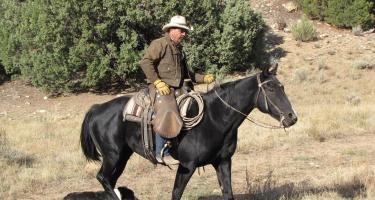 Butch and Jeanie Jensen’s fifth generation T.N. Ranching Company and Tavaputs Ranch, located in Carbon County, is a cow-calf operation, encompassing two herds of more than 1,200 cattle on approximately 30,000 acres of private rangeland and 320,000 acres of state and federal rangeland.
Butch and Jeanie Jensen’s fifth generation T.N. Ranching Company and Tavaputs Ranch, located in Carbon County, is a cow-calf operation, encompassing two herds of more than 1,200 cattle on approximately 30,000 acres of private rangeland and 320,000 acres of state and federal rangeland.
https://www.landcan.org/success/Tavaputs-Ranch/3425/
By:
Leopold Conservation Award Program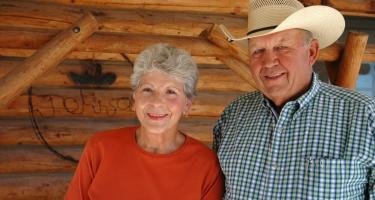 One would be hard pressed to find someone more connected to their land than Darrell and Carol Johnson. The Johnson Ranch, in Tooele County, has been part of Darrell’s life for longer than he can remember. He grew up working on the ranch and planned how he would run the operation until he got his opportunity in 1962 when he began to purchase land from his uncles. He partnered with his father, Orson, until 1988.
One would be hard pressed to find someone more connected to their land than Darrell and Carol Johnson. The Johnson Ranch, in Tooele County, has been part of Darrell’s life for longer than he can remember. He grew up working on the ranch and planned how he would run the operation until he got his opportunity in 1962 when he began to purchase land from his uncles. He partnered with his father, Orson, until 1988.
https://www.landcan.org/success/Johnson-Ranch/3423/
 Sign In
Sign In
 Sign In
Sign In
